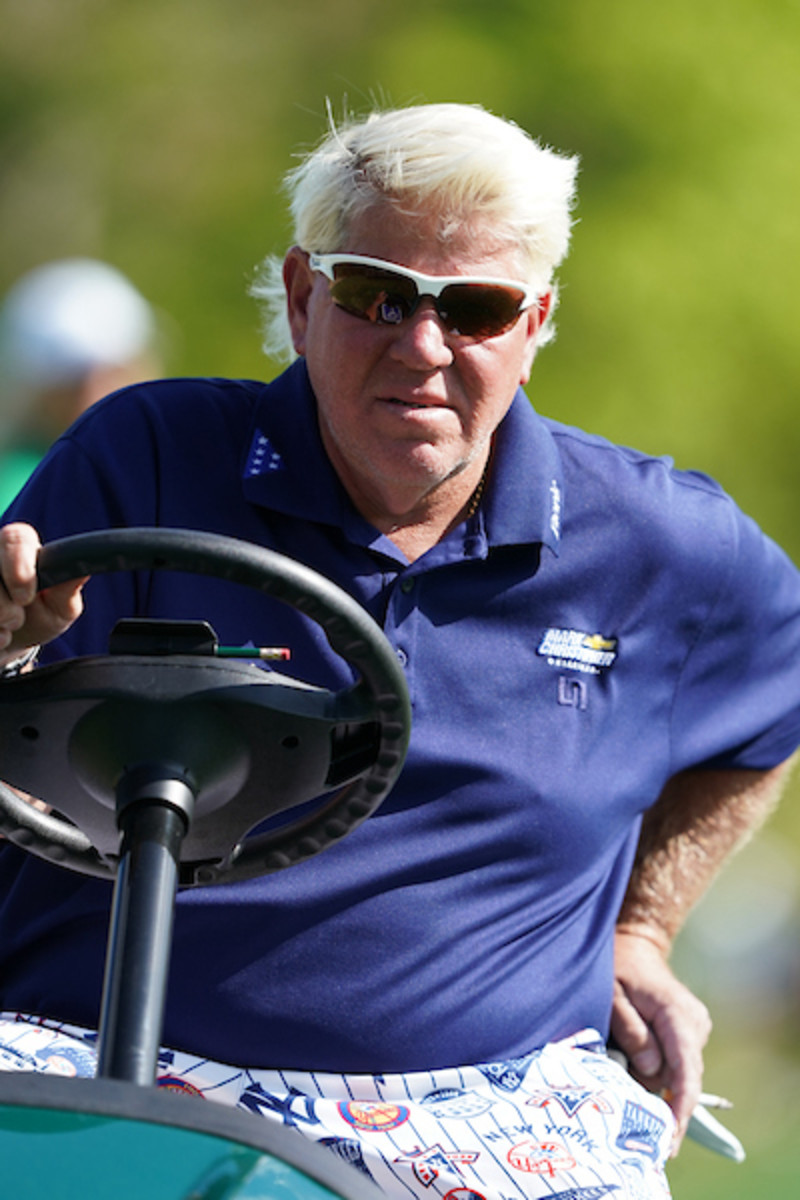
In telling John Daly to take a hike, R&A trips
John Daly never was going to win the 148th British Open anyway. So, why make such a big deal of a 53-year-old man riding a cart next week at Royal Portrush?
Brooks Koepka’s victory in the PGA Championship at Bethpage in May hardly was tainted because Daly, a former PGA champion, used a cart. Daly was, at best, a footnote for that week in May as he missed the cut by seven strokes. But the PGA of America understood a valuable lesson: Humanity is bigger than the game.

John Daly, who suffers from degenerative arthritis in his right knee, persuaded the PGA of America to let him use a cart during the recent PGA Championship, but he had no such luck with the R&A for next week’s British Open.
(© GOLFFILE/FRAN CAFFREY)
Many observers contend that Daly, who has degenerative arthritis in his right knee, does not deserve to use a cart, but that’s not the issue. It’s what is right and fair under the laws and mores of a free society.
It might seem as if I’m making a mountain out of a sidehill lie, but regardless of what has been happening recently in the world, laws are what keep us from seeping into anarchy. The documents that create them – be it our Constitution or England’s Magna Carta – have been our guiding principles for as long as the U.S. and present-day Great Britain have been nations.
When the decision in PGA Tour v. Casey Martin was handed down by the U.S. Supreme Court in May 2001, allowing Martin, a disabled golfer, to compete with a cart on the Tour, the Tour argued that walking was an integral part of the game.
The Ninth Circuit Court of Appeals disagreed with the Tour and almost every other argument used to try to stop Martin from competing. The Supreme Court affirmed the lower court’s decision that walking was not an integral part of the game.
According to the majority opinion: “That court [Ninth Circuit] found that the walking rule’s purpose was to inject fatigue into the skill of shot-making, but that the fatigue injected by walking a golf course cannot be deemed significant under normal circumstances; determined that even with the use of a cart, the fatigue Martin suffers from coping with his disability is greater than the fatigue his able-bodied competitors endure from walking the course; and concluded that it would not fundamentally alter the nature of petitioner’s game to accommodate Martin.”
The R&A, in its statement Friday declining Daly’s request to use a riding cart, used the same argument that the PGA Tour proposed nearly two decades ago, stating, “Walking the course is an integral part of the game.” The R&A wasn’t arguing in front of a court of learned justices but rather excusing abhorrent behavior in denying a disabled person a reasonable accommodation.
That same theory, which the Supreme Court rejected in a 7-2 vote, has been grabbed by the R&A much like a winter blanket, hoping that the governing body can hide under it with little more than a week before the start of the British Open.
Daly does not come to mind when thinking of a person who is disabled. In many observers’ minds, he clearly has created any disability with a lifestyle for which he makes no apologies. He even has written a book and sung songs about his hard-drinking, hard-living years.
But this is not so much about Daly, per se, as it is a bigger question about how the R&A should deal with disabled golfers in its championships.
Under the U.K. Equality Act of 2010, someone is defined as disabled if he has “a physical or mental impairment that has a 'substantial' and 'long-term' negative effect on [his] ability to do normal daily activities.” The same act created a duty to make reasonable adjustments for disabled people where they would be at a substantial disadvantage if the adjustments were not made.
In this case, Daly, the 1995 British Open champion, still intends to compete, but he clearly will be playing at a substantial disadvantage.
The R&A continued in its statement of denial: “The terrain at Royal Portrush is not suited to buggies, and indeed the club itself does not permit their use. We have a serious concern that some parts of the course, where there are severe slopes and swales, would be inaccessible.”
Oddly, the British Open website includes a section called Accessibility and a subsection headlined “Mobility Scooters.” Under the subsection, the R&A outlines the ability of ticket holders with disabilities to bring their own mobility scooters to the course if they meet the criteria for use at Royal Portrush during the Open.
It seems unreasonable to assume that a disabled person would navigate outside the ropes better than Daly inside the ropes, yet that is another argument the R&A is using to deny a disabled person access.
When women faced discrimination at certain private clubs on the R&A’s British Open rotation, the R&A forced the issue. Why is a physical disability any different? Why should the R&A deny a person access to compete in an event in which he earned the right to compete?
Hopefully, this incident is not over, because the world is watching and the R&A should be better than this.